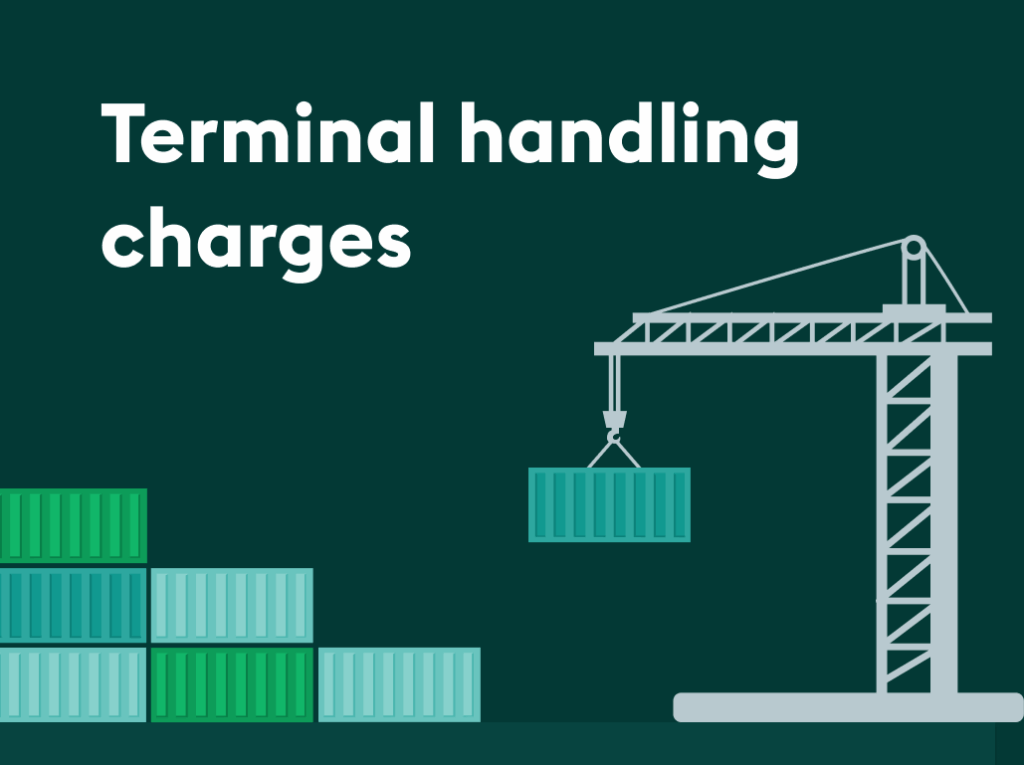- By TOP CHINA FREIGHT
- August 14, 2025
- Shipping
Terminal handling charges (THC) are one of the most important, yet often overlooked, costs in international shipping. They are fees applied by port terminals for the loading, unloading, and movement of containers. For shippers, exporters, and freight forwarders, understanding THC is crucial for cost management, efficient transportation, and timely delivery of goods.

1.What Are Terminal Handling Charges?
Terminal handling charges refer to fees levied by port terminals for handling containers during their time at the port. This includes:
1.Unloading containers from ships or barges
2.Transferring containers within terminal yards
3.Loading containers onto trucks or rail wagons
4.Temporary storage within the port
Unlike ocean freight or inland transportation, THC specifically covers port operations. Understanding it is key for accurate shipping cost planning.
2.Why Terminal Handling Charges Matter
Terminal handling charges influence both cost and delivery schedules. Here’s why:
1.Cost Management:
THC can represent 10–20% of total shipping expenses.
2.Transportation Efficiency:
Delays in handling can extend truck or rail transit times.
3.Supply Chain Planning:
Accurate THC forecasting allows better budgeting and logistics planning.
Transportation Insight:
Roughly 30% of THC-related operations directly involve cargo movement via trucks, rail, or barges.
3.Types of Terminal Handling Charges
| THC Type | Description | Transportation Impact |
|---|---|---|
| Standard Container THC | Applies to 20ft & 40ft containers | Influences loading/unloading speed |
| Refrigerated Container THC | Temperature-controlled containers | Requires electricity, affects port dwell time |
| Hazardous Cargo THC | Flammable or dangerous goods | Extra handling slows down transportation |
| Empty Container THC | Fees for handling empty containers | Impacts pickup and return logistics |
| Peak Season THC | Extra fees during high traffic periods | Can delay truck, rail, and vessel schedules |
4.How Terminal Handling Charges Are Calculated
THC is generally based on several factors:
- Container size: 20ft vs 40ft
- Cargo type: standard, refrigerated, hazardous
- Weight and volume of cargo
- Port-specific tariffs and peak season adjustments
Example THC Rates (USD per container):
| Container Type | Low Range | High Range |
|---|---|---|
| 20ft Standard | $150 | $250 |
| 40ft Standard | $250 | $400 |
| 20ft Refrigerated | $200 | $300 |
| 40ft Refrigerated | $300 | $450 |
| Hazardous Cargo | $300 | $500 |
5.Terminal Handling Charges and Transportation
Terminal handling charges are directly connected to transportation efficiency.
1.Sea Freight:
THC covers the ship-to-dock and dock-to-truck/rail operations. Delays in terminal handling can increase total transit time.
2.Rail Freight:
THC includes moving containers from port to rail yards, ensuring schedules are maintained.
3.Truck Freight:
THC guarantees containers are loaded safely onto trucks, affecting last-mile delivery speed.
4.Intermodal Shipping:
THC coordination is critical when containers move through multiple modes (ship, rail, truck).
6.Global Examples of Terminal Handling Charges
| Port | THC Range (USD) | Key Notes |
|---|---|---|
| Los Angeles, USA | $150–$350 | Congested port; peak season surcharges |
| Shanghai, China | $250–$500 | One of the busiest ports; efficient handling essential |
| Rotterdam, Netherlands | $200–$300 | Advanced automation reduces delays |
| Singapore | $180–$320 | Fast container turnaround |
| Hamburg, Germany | $220–$400 | Standard vs refrigerated containers affect THC |
| Dubai, UAE | $200–$350 | Additional fees for hazardous cargo |
7.Strategies to Minimize Terminal Handling Charges
Compare THC rates across multiple ports.
Reduce the number of containers shipped.
Freight forwarders can often secure discounted THC for high-volume shipments.
Avoid port congestion during peak seasons.
Align trucks, rail, or barge schedules with port operations.
Many terminals now provide online THC tracking.
Consider the cost difference between standard and refrigerated containers.
8.Case Study: Impact of THC on Shipping Costs
A medium-sized importer shipping 10 x 40ft containers from Shanghai to Los Angeles:
| Container | Ocean Freight | THC | Total Cost |
|---|---|---|---|
| 40ft Standard | $1,500 | $350 | $1,850 |
| 40ft Refrigerated | $1,500 | $450 | $1,950 |
Insight: THC accounts for up to 18% of the total shipping cost for refrigerated containers. Proper planning can reduce costs by negotiating THC or consolidating shipments.
9.Advanced Planning Tips
1.Align Transportation Modes:
Ensure truck or rail schedules match container release times.
2.Monitor Peak Seasons:
Avoid sending shipments during national holidays or high-demand periods.
3.Track Container Movement:
Digital THC management systems help forecast delays and fees.
4.Work With Experienced Forwarders:
They know which ports offer the lowest THC for specific container types.
Conclusion
Terminal handling charges (THC) are a key part of shipping costs that impact transportation efficiency and delivery timelines. Understanding THC helps shippers and freight forwarders plan logistics, reduce delays, and control expenses. By choosing the right ports, consolidating shipments, negotiating rates, and coordinating transport schedules, businesses can optimize THC management and maintain a smooth, cost-effective supply chain.
Need a Shipping Quote?
If you want expert guidance and peace of mind, our team is ready to assist.
TJ China Freight offers tailored solutions to help businesses of all sizes ship more reliably from China.
FAQs
Q1:Are THCs fixed?
No, they vary depending on port, container type, and cargo volume.
Q2:Do THCs include customs clearance?
No, customs duties and inspections are separate charges.
Q3:Can THCs be negotiated?
Yes, especially for high-volume shippers or long-term contracts.
Q4:Do THCs affect delivery time?
Yes, efficient handling reduces delays in truck, rail, or vessel transportation.
Q5:Are there hidden costs in THC?
Some terminals charge extra for weekend handling, reefer monitoring, or hazardous goods.
